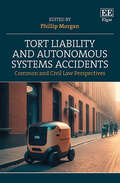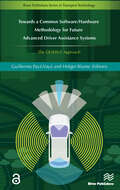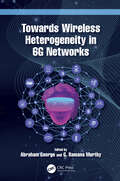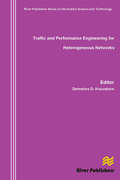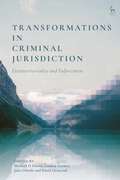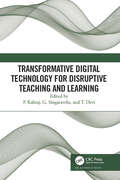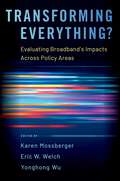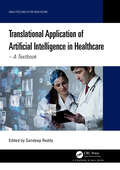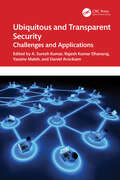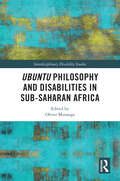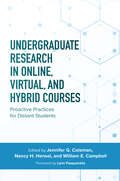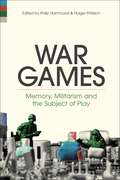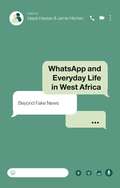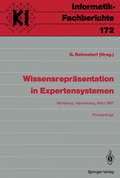- Table View
- List View
Tools and Algorithms for the Construction and Analysis of Systems: 27th International Conference, TACAS 2021, Held as Part of the European Joint Conferences on Theory and Practice of Software, ETAPS 2021, Luxembourg City, Luxembourg, March 27 – April 1, 2021, Proceedings, Part II (Lecture Notes in Computer Science #12652)
This open access two-volume set constitutes the proceedings of the 27th International Conference on Tools and Algorithms for the Construction and Analysis of Systems, TACAS 2021, which was held during March 27 – April 1, 2021, as part of the European Joint Conferences on Theory and Practice of Software, ETAPS 2021. The conference was planned to take place in Luxembourg and changed to an online format due to the COVID-19 pandemic. The total of 41 full papers presented in the proceedings was carefully reviewed and selected from 141 submissions. The volume also contains 7 tool papers; 6 Tool Demo papers, 9 SV-Comp Competition Papers. The papers are organized in topical sections as follows: Part I: Game Theory; SMT Verification; Probabilities; Timed Systems; Neural Networks; Analysis of Network Communication. Part II: Verification Techniques (not SMT); Case Studies; Proof Generation/Validation; Tool Papers; Tool Demo Papers; SV-Comp Tool Competition Papers.
Tools and Algorithms for the Construction and Analysis of Systems: 28th International Conference, TACAS 2022, Held as Part of the European Joint Conferences on Theory and Practice of Software, ETAPS 2022, Munich, Germany, April 2–7, 2022, Proceedings, Part I (Lecture Notes in Computer Science #13243)
This open access book constitutes the proceedings of the 28th International Conference on Tools and Algorithms for the Construction and Analysis of Systems, TACAS 2022, which was held during April 2-7, 2022, in Munich, Germany, as part of the European Joint Conferences on Theory and Practice of Software, ETAPS 2022. The 46 full papers and 4 short papers presented in this volume were carefully reviewed and selected from 159 submissions. The proceedings also contain 16 tool papers of the affiliated competition SV-Comp and 1 paper consisting of the competition report. TACAS is a forum for researchers, developers, and users interested in rigorously based tools and algorithms for the construction and analysis of systems. The conference aims to bridge the gaps between different communities with this common interest and to support them in their quest to improve the utility, reliability, exibility, and efficiency of tools and algorithms for building computer-controlled systems.
Tools and Algorithms for the Construction and Analysis of Systems: 28th International Conference, TACAS 2022, Held as Part of the European Joint Conferences on Theory and Practice of Software, ETAPS 2022, Munich, Germany, April 2–7, 2022, Proceedings, Part II (Lecture Notes in Computer Science #13244)
This open access book constitutes the proceedings of the 28th International Conference on Tools and Algorithms for the Construction and Analysis of Systems, TACAS 2022, which was held during April 2-7, 2022, in Munich, Germany, as part of the European Joint Conferences on Theory and Practice of Software, ETAPS 2022. The 46 full papers and 4 short papers presented in this volume were carefully reviewed and selected from 159 submissions. The proceedings also contain 16 tool papers of the affiliated competition SV-Comp and 1 paper consisting of the competition report. TACAS is a forum for researchers, developers, and users interested in rigorously based tools and algorithms for the construction and analysis of systems. The conference aims to bridge the gaps between different communities with this common interest and to support them in their quest to improve the utility, reliability, exibility, and efficiency of tools and algorithms for building computer-controlled systems.
Topics in Cryptology –- CT-RSA 2015: The Cryptographer's Track at the RSA Conference 2015, San Francisco, CA, USA, April 20-24, 2015. Proceedings (Lecture Notes in Computer Science #9048)
This book constitutes the refereed proceedings of the Cryptographer's Track at the RSA Conference 2015, CT-RSA 2015, held in San Francisco, CA, USA, in April 2015. The 26 papers presented in this volume were carefully reviewed and selected from 111 submissions. The focus of the track is on following subjects: timing attacks, design and analysis of block ciphers, attribute and identity based encryption, membership, secure and efficient implementation of AES based Cryptosystems, chosen ciphertext attacks in theory and practice, algorithms for solving hard problems, constructions of hash functions and message authentication codes, secure multiparty computation, authenticated encryption, detecting and tracing malicious activities, implentation attacks on exponentiation algorithms and homomorphic encryption and its applications.
Tort Liability and Autonomous Systems Accidents: Common and Civil Law Perspectives
Autonomous systems driven by artificial intelligence (AI) technologies have significant potential for increased productivity and improved safety in many sectors, but it is inevitable that some accidents will occur. The law needs an adequate way to respond to these scenarios and compensate those wrongfully injured. This comprehensive book examines the unique difficulties that autonomous systems create for existing accident compensation systems founded on tort, and proposes solutions.Its chapters question the adequacy of accident compensation systems designed around the human wrongdoer, or a human whose conduct can be attributed to a legal person, when the 'wrongdoer' is an autonomous system. With a multi-jurisdictional approach, including both common and civil law perspectives, this book examines the many challenges that autonomous systems present in tort law and sets forth that tort lawyers will need to significantly adjust their thinking to face these challenges. Focus is given to proposals and developments at an EU level and finding solutions to the problems brought about by autonomous systems.This insightful text will be of great value to both students, researchers and practitioners in tort law, accident compensation and AI. High tech companies, think tanks, consultancies and organisations interested in autonomous systems and accidents will also widely benefit from its expertise.
Towards a Common Software/Hardware Methodology for Future Advanced Driver Assistance Systems
The European research project DESERVE (DEvelopment platform for Safe and Efficient dRiVE, 2012-2015) had the aim of designing and developing a platform tool to cope with the continuously increasing complexity and the simultaneous need to reduce cost for future embedded Advanced Driver Assistance Systems (ADAS). For this purpose, the DESERVE platform profits from cross-domain software reuse, standardization of automotive software component interfaces, and easy but safety-compliant integration of heterogeneous modules. This enables the development of a new generation of ADAS applications, which challengingly combine different functions, sensors, actuators, hardware platforms, and Human Machine Interfaces (HMI). This book presents the different results of the DESERVE project concerning the ADAS development platform, test case functions, and validation and evaluation of different approaches. The reader is invited to substantiate the content of this book with the deliverables published during the DESERVE project. Technical topics discussed in this book include:Modern ADAS development platforms;Design space exploration;Driving modelling;Video-based and Radar-based ADAS functions;HMI for ADAS;Vehicle-hardware-in-the-loop validation systems
Towards Wireless Heterogeneity in 6G Networks
The connected world paradigm effectuated through the proliferation of mobile devices, Internet of Things (IoT), and the metaverse will offer novel services in the coming years that need anytime, anywhere, high-speed access. The success of this paradigm will highly depend on the ability of the devices to always obtain the optimal network connectivity for an application and on the seamless mobility of the devices. This book will discuss 6G concepts and architectures to support next-generation applications such as IoT, multiband devices, and high-speed mobile applications. IoT applications put forth significant challenges on the network in terms of spectrum utilization, latency, energy efficiency, large number of users, and supporting different application characteristics in terms of reliability, data rate, and latency.While the 5G network developmentwas motivated by the need for larger bandwidth and higher quality of service (QoS), 6G considerations are supporting many users with a wide application requirement, lowering network operating cost, and enhanced network flexibility. Network generations beyond 5G are expected to accommodate massive number of devices with the proliferation of connected devices concept in connected cars, industrial automation, medical devices, and consumer devices.This book will address the fundamental design consideration for 6G networks and beyond. There are many technical challenges that need to be explored in the next generation of networks, such as increased spectrum utilization, lower latency, higher data rates, accommodating more users, heterogeneous wireless connectivity, distributed algorithms, and device-centric connectivity due to diversified mobile environments and IoT application characteristics. Since 6G is a multidisciplinary topic, this book will primarily focus on aspects of device characteristics, wireless heterogeneity, traffic engineering, device-centric connectivity, and smartness of application.
Traffic and Performance Engineering for Heterogeneous Networks
The diversity of methodologies and applications in the literature for the traffic engineering, performance modelling and analysis of convergent multiservice heterogeneous networks attests to the breath and richness of recent research and developments towards the design and dimensioning of the next and future generation Internets.Heterogeneous Networks: Traffic Engineering, Performance Evaluation Studies and Tools describes recent advances in networks of diverse technology reflecting the state-of-the-art technology and research achievements in traffic engineering, performance evaluation studies and tools worldwide. Technical topics presented in the book include:• Traffic Modelling and Characterisation• Queueing and Interconnection Networks• Performance Evaluation Studies• TCP Performance Analysis• Congestion Control• Application Layer Multicast• Numerical and Software Tools;This book contains recently extended research papers, which have their roots in the series of the HET-NETs International Working Conferences focusing on the 'Performance Modelling and Evaluation of Heterogeneous Networks' under the auspices of the EU Networks of Excellence Euro-NGI and Euro-FGI. Heterogeneous Networks: Traffic Engineering, Performance Evaluation Studies and Tools is ideal for personnel in computer/communication industries as well as academic staff and master/research students in computer science, operational research, electrical engineering and telecommunication systems and the Internet.
Transformations in Criminal Jurisdiction: Extraterritoriality and Enforcement
Can traditional approaches to criminal jurisdiction adapt to the new global reality of the digital era? In this innovative book, leading experts in criminal, international and internet law unite to address this fundamental question. They consider how jurisdictional regimes are orientated around concepts of territoriality and extraterritoriality, how these categories are increasingly blurred in the digital era, and how a range of jurisdictional transformations are occurring in the process.Part I presents novel doctrinal, empirical and theoretical perspectives on criminal jurisdiction, exploring how states are shaping and reimagining jurisdictional concepts in the crafting and interpretation of criminal offences, and the ramifications of increasing jurisdictional concurrency in state practice. Part II focuses on the investigative and enforcement powers of the state to assess how these issues are transforming traditional understandings of jurisdictional rules and boundaries, the challenges and opportunities that these present for law enforcement authorities, and the sorts of constraints and safeguards that may be necessary as a result. The picture that emerges is a world of jurisdictional rules in a state of flux, which demands the diversity of legal perspectives presented in this book for documenting, rationalising and moving beyond the transformations that are taking shape in modern statecraft.
Transformative Digital Technology for Disruptive Teaching and Learning
Generation Z students are avid gamers and are always on social media. Smart like their phones, they must be educated in a smart manner, which involves the use of digital tools. Transformative Digital Technology for Disruptive Teaching and Learning provides smart education solutions and details ways in which Gen Z learners can be educated. It covers such digital learning strategies as blended learning, flipped learning, mobile learning, and gamification. It examines creative teaching–learning strategies to encourage modern learners to learn more quickly. The book discusses ways to accelerate the capabilities of teaching and learning transactions. It also covers innovative teaching and learning processes to meet the challenges of digital learners.Starting with an overview of digital learning resources and processes as well as their advantages and disadvantages, the book then discusses such approaches and strategies as follows: Learner-oriented and learner-friendly approaches Blended learning Active learning Experiential learning Virtual learning Applications of Cloud Computing and Artificial Intelligence Gamification LMS challenges and techno-pedagogical issues for modern life As digital technology is disrupting teaching and learning, especially the skill development of students in the era of Industry 4.0 and 5.0, this is a timely book. It provides methods, approaches, strategies, and techniques for innovative learning and teaching. It discusses how to leverage new technology to enhance educators’ and learners’ abilities and performance. A comprehensive reference guide for educational researchers and technology developers, the book also helps educators embrace the digital transformation of teaching and learning.
Transforming Everything?: Evaluating Broadband's Impacts Across Policy Areas
Broadband, or high-speed internet, has been called the most important infrastructure challenge of the century. It has the potential to connect remote communities, streamline health care services, and support innovation across education, economics, and numerous other fields. Given the growing and widespread investments in broadband, how can citizens and policymakers determine whether the promise of broadband is being fulfilled? Transforming Everything? offers a comprehensive guide to the complexities and possibilities of broadband as a social technology. It addresses challenges for evaluating broadband initiatives across diverse contexts and proposes guidance and methods for evaluation for policymakers and researchers. Contributors draw on pioneering research in program evaluation and information technology to explore broadband applications in health, education, and civic engagement. They also address key measurement and evaluation challenges in the field today, including issues in privacy and security and inadequate research methods for target populations. Collectively, the chapters in this volume raise important questions for improving research and evaluation in broadband use and producing actionable evidence in a highly dynamic environment. Transforming Everything? prepares readers with a critical understanding of broadband technology and the necessary evidence to assess whether broadband programs and policy are truly empowering the communities they serve.
Transforming Teacher Education with Mobile Technologies (Reinventing Teacher Education)
Transforming Teacher Education with Mobile Technologies provides an international, comparative overview of current thinking and research in the field of mobile learning and teaching/teacher education, with case studies from Australia, Germany, Ireland, Norway, Sweden, Turkey and the United Kingdom. Drawing together contributions with teachers and teacher educators engaged in a European project, this book investigates practices further afield and provides insight into research and cutting-edge pedagogical practice in teaching and teacher education using mobile learning. Students use personal technologies like their mobile phones, extensively and expect to be constantly connected and engaged in a networked world. It is imperative, therefore, that teachers keep pace with this ever-shifting landscape and this is a challenge to those in the profession and more widely to teacher education which is tasked with preparing the next generation of teachers. This volume provides some answers to these challenges, linking theory to practice and developing theoretical models. The contributors also explore possible future developments in this field using an innovative methodology associated with Future Thinking Scenario Planning (Snoek, 2004).
Translational Application of Artificial Intelligence in Healthcare: - A Textbook (Analytics and AI for Healthcare)
In the era of 'Algorithmic Medicine', the integration of Artificial Intelligence (AI) in healthcare holds immense potential to address critical challenges faced by the industry. Drawing upon the expertise and experience of the authors in medicine, data science, medical informatics, administration, and entrepreneurship, this textbook goes beyond theoretical discussions to outline practical steps for transitioning AI from the experimental phase to real-time clinical integration. Using the Translational Science methodology, each chapter of the book concisely and clearly addresses the key issues associated with AI implementation in healthcare. Covering technical, clinical, ethical, regulatory, and legal considerations, the authors present evidence-based solutions and frameworks to overcome these challenges. Engaging case studies and a literature review of peer-reviewed studies and official documents from reputed organizations provide a balanced perspective, bridging the gap between AI research and actual clinical practice.
Trust in the Network Economy (Evolaris #2)
A lack of trust in online-transactions has been described as one of the most important obstacles for the development of e-business. Despite numerous activities in the fields of law and security, users have not yet gained the trust necessary for conducting e-business. This requires a new approach which is able to explain the importance and function of trust in the digital world. This book presents a new model of digital trust that is complemented by articles on law, security, business models and trust building signals. The book is published in a mixed German/English edition and is the first international reader covering trust and e-business from a multi-disciplinary approach.
Ubiquitous and Transparent Security: Challenges and Applications
In an increasingly interconnected digital realm, Ubiquitous and Transparent Security: Challenges and Applications emerges as a guiding beacon through the intricate web of modern cybersecurity. This comprehensive tome meticulously dissects the multifaceted challenges faced in safeguarding our digital infrastructure. From the omnipresence of threats to the evolving landscape of vulnerabilities, this book navigates the complexities with a keen eye, offering a panoramic view of the security terrain.Drawing on a rich tapestry of insights from leading experts, this book transcends the traditional boundaries of security discourse. It unveils innovative strategies and technologies, illuminating the path toward a future where security seamlessly integrates with the fabric of our digital existence. With a keen focus on transparency, it delves deep into the mechanisms that enable a clear, holistic view of security, empowering stakeholders to navigate this dynamic landscape with confidence.From cutting-edge applications to the ethical considerations of ubiquitous security, each chapter acts as a guiding compass, providing actionable insights and fostering a deeper understanding of the intricate balance between accessibility and protection. Ubiquitous and Transparent Security is not merely a book; it’s a roadmap for practitioners, policymakers, and enthusiasts alike, navigating the ever-evolving world of cybersecurity.Each chapter within this compendium illuminates the diverse challenges that confront security practitioners, policymakers, and technologists today. It goes beyond the conventional paradigms, exploring the nuanced intersections between accessibility, transparency, and robust protection. Through a rich amalgamation of research-backed insights, real-world case studies, and visionary forecasts, this book offers a holistic understanding of the evolving threat landscape, empowering stakeholders to fortify their defenses proactively.
Ubuntu Philosophy and Disabilities in Sub-Saharan Africa (Interdisciplinary Disability Studies)
This book uses Ubuntu philosophy to illuminate the voices of people with disabilities from Sub-Saharan Africa. Disability literature is largely dominated by scholars and studies from the Global North, and these studies are largely informed by Global North theories and concepts. Although disability literature in the Global South is now fast growing, most studies continue to utilise conceptual, theoretical, and philosophical frameworks that are framed within Global North contexts. This presents two major challenges: Firstly, the voices of people with disabilities in the Global South remain on the fringes of disability discourses. Secondly, when their voices are heard, their realities are distorted. This edited book, consisting of 11 chapters, provides case studies from Botswana, Ghana, Lesotho, Uganda, and South Africa, explores disability in various fields: Inclusive education, higher education, environment, Open Distance Learning, and Technical and Vocational Education and Technical Colleges. The book contributes to the ways in which disability is understood and experienced in the Global South thereby challenging the Western hegemonic discourses on disability. This collection of contributions will be of interest to all scholars and students of disability studies, development studies, medical sociology, and African studies.
UML-Based Software Product Line Engineering with SMarty
This book is about software product lines (SPLs) designed and developed taking UML diagrams as the primary basis, modeled according to a rigorous approach composed of an UML profile and a systematic process for variability management activities, forming the Stereotype-based Management of Variability (SMarty) approach. The book consists of five parts. Part I provides essential concepts on SPL in terms of the first development methodologies. It also introduces variability concepts and discusses SPL architectures finishing with the SMarty approach. Part II is focused on the design, verification and validation of SMarty SPLs, and Part III concentrates on the SPL architecture evolution based on ISO/IEC metrics, the SystEM-PLA method, optimization with the MOA4PLA method, and feature interaction prevention. Next, Part IV presents SMarty as a basis for SPL development, such as, the M-SPLearning SPL for mobile learning applications, the PLeTs SPL for testing tools, the PlugSPL plugin environment for supporting the SPL life cycle, the SyMPLES approach for designing embedded systems with SysML, the SMartySPEM approach for software process lines (SPrL), and re-engineering of class diagrams into an SPL. Eventually, Part V promotes controlled experimentation in UML-based SPLs, presenting essential concepts on how to plan, conduct, and document experiments, as well as showing several experiments carried out with SMarty. This book aims at lecturers, graduate students and experienced practitioners. Lecturers might use the book for graduate level courses about SPL fundamentals and tools; students will learn about the SPL engineering process, variability management, and mass customization; and practitioners will see how to plan the transition from single-product development to an SPL-based process, how to document inherent variability in a given domain, or how to apply controlled experiments to SPLs.
Undergraduate Research in Online, Virtual, and Hybrid Courses: Proactive Practices for Distant Students
Co-published with and With the growing interest in undergraduate research as a high-impact practice, and the recognition that college education is increasingly moving online, this book – the first to do so – provides a framework, guidance from pioneering practitioners, and a range of examples across disciplines on how to engage remote students in research.Two foundational chapters set the scene. For those new to incorporating undergraduate research in their courses, the opening chapter provides an introduction to its evolution and practice, and reviews the evidence of its benefits for students, faculty, and institutions. The second addresses the benefit that undergraduate research can bring to online learning and provides an overview of the ways research can be incorporated into online and virtual courses to meet the course and student learning objectives. The remaining chapters illustrate implementation of undergraduate research in courses across many disciplines. They address thematic issues related to the work and its effects on students, such as transitioning them from users of, to active participants in, research; and consideration of the technological tools needed to support students in a virtual environment. The contributors, some of whom have been implementing these practices for some years, offer important insights and expertise.While the examples range across the behavioral sciences, business, education, the health professions, the humanities, social sciences, and STEM, readers will find much of value and inspiration from reading the chapters beyond their disciplines.
Using and Administering an Apollo Network (Computer Science Series)
A user's guide to exploiting the features of the Apollo range of workstations, especially in the scientific and technical context. Written by a team of authors consisting of academics and specialists working for the manufacturers.
Using Video to Foster Teacher Development: Improving Professional Practice through Adaptation and Reflection
Featuring an international team of education researchers and practitioners, this edited volume demonstrates various ways in which the use of video recordings can shed light on and improve teaching processes in the classroom environment.Providing a novel and global approach to this burgeoning area of research, chapters highlight how authentic video clips can be used systematically in both teacher education and professional development programs to ensure lifelong professional reflection and growth for teachers. Through detailed insight into research projects where teachers and teacher educators use video to improve practice, the book provides a research-based response to why and how videos can be used to raise instructional quality and discuss key issues in the field.Exploring findings from empirically based research combined with everyday practices, the volume will ultimately serve as a solid and inspiring introduction to the growing body of research on the use of video in teacher learning for educational researchers and educators interested in teaching and teaching practices, as well as practitioners in the fields of teacher education and teachers’ professional development.
Video Theories: A Transdisciplinary Reader (International Texts in Critical Media Aesthetics)
Breaking new ground as the first transdisciplinary reader on video theory, Video Theories is a resource that will form the basis for further research and teaching. With video regarded as a ubiquitous medium, it's surprising that video theory as an academic discipline has not yet been established in comparison to the more canonized theories of photography, film, and television. This “video gap” in media theory is remarkable considering today's omnipresence of the medium through online video portals (such as Youtube, Vimeo, Snapchat or Instagram). Video technologies address us in our everyday online tasks, and they have opened up and superseded text-based web browsers in many aspects.Consisting of a selection of annotated source texts and chapter introductions written by the editors, this book takes into account fifty years of scholarly and artistic reflections on the topic, representing an intergenerational and international set of voices. This is also accompanied by a timeline to help contextualize and frame the techno-cultural developments of video since the analog days. Theorists and artists old and new, like Jacques Derrida, Marshall Mcluhan, Jean-Luc Godard and Paul Virilio, are joined together in this unique collection with almost half the work translated into English for the first time. This transdisciplinary reader offers a conceptual framework for diverging and contradictory viewpoints, following up the continuous transformations of what was / is / will be video.
War Games: Memory, Militarism and the Subject of Play
Many of today's most commercially successful videogames, from Call of Duty to Company of Heroes, are war-themed titles that play out in what are framed as authentic real-world settings inspired by recent news headlines or drawn from history. While such games are marketed as authentic representations of war, they often provide a selective form of realism that eschews problematic, yet salient aspects of war. In addition, changes in the way Western states wage and frame actual wars makes contemporary conflicts increasingly resemble videogames when perceived from the vantage point of Western audiences.This interdisciplinary volume brings together scholars from games studies, media and cultural studies, politics and international relations, and related fields to examine the complex relationships between military-themed videogames and real-world conflict, and to consider how videogames might deal with history, memory, and conflict in alternative ways. It asks: What is the role of videogames in the formation and negotiation of cultural memory of past wars? How do game narratives and designs position the gaming subject in relation to history, war and militarism? And how far do critical, anti-war/peace games offer an alternative or challenge to mainstream commercial titles?
What AI Can Do: Strengths and Limitations of Artificial Intelligence
The philosopher Spinoza once asserted that no one knows what a body can do, conceiving an intrinsic bodily power with unknown limits. Similarly, we can ask ourselves about Artificial Intelligence (AI): To what extent is the development of intelligence limited by its technical and material substrate? In other words, what can AI do? The answer is analogous to Spinoza’s: Nobody knows the limit of AI. Critically considering this issue from philosophical, interdisciplinary, and engineering perspectives, respectively, this book assesses the scope and pertinence of AI technology and explores how it could bring about both a better and more unpredictable future. What AI Can Do highlights, at both the theoretical and practical levels, the cross-cutting relevance that AI is having on society, appealing to students of engineering, computer science, and philosophy, as well as all who hold a practical interest in the technology.
WhatsApp and Everyday Life in West Africa: Beyond Fake News
WhatsApp is the most popular messaging platform in over 80% of countries in West Africa, and a daily port of call for a wide range of information and services. This edited collection seeks to examine the impact that this transformative technology has had beyond the much-discussed role it has played in the spread of misinformation, and explore more widely the fundamental changes that WhatsApp has brought to many citizens' lives in social, economic and political contexts.Ranging across subjects including political organisation, religious practice, and family relations, each author in this volume brings direct knowledge and testimony of the impact of WhatsApp across West African society.
Wissensrepräsentation in Expertensystemen: Workshop, Herrenberg, 16.18. März 1987 Proceedings (Informatik-Fachberichte #172)
Das Buch enthält die Beiträge des Workshops "Wissensrepräsentation in Expertensystemen", der vom 16. bis 18.3.1987 von der IBM Deutschland GmbH in Herrenberg durchgeführt wurde. Wissensrepräsentation ist für viele Anwendungen der Künstlichen Intelligenz von zentraler Bedeutung. Bei der Umsetzung von Ergebnissen der Forschung in Anwendungen wird die Wissensrepräsentation wegen ihrer Verankerung in so verschiedenen Gebieten wie Logik, Linguistik und Psychologie unübersichtlich. Es gibt keine einheitliche Systematisierung. Hinzu kommt, daß die Probleme der Wissensrepräsentation erst an größeren Anwendungen in ihrer vollen Tragweite erkennbar werden. In dem Workshop wurde daher versucht, das Thema interdisziplinär und systematisch zu behandeln. Dabei ging es weniger um die Darstellung von Projekten, bei denen die Wissensrepräsentation meistens nur peripher und unter spezifischen Projektaspekten diskutiert wird, sondern um eine gezielte Thematisierung der zentralen Fragestellungen in aufeinander abgestimmten Abschnitten: Orientierung und Grundlagen, Sprachen und Methoden der Wissensrepräsentation, Spezifische Teilprobleme (Raum- und Zeitaspekte), Wissenserwerb und Wissensverarbeitung. Das Buch stellt in konzentrierter Form Beiträge von herausragenden Forschern auf diesem Gebiet zusammen.




